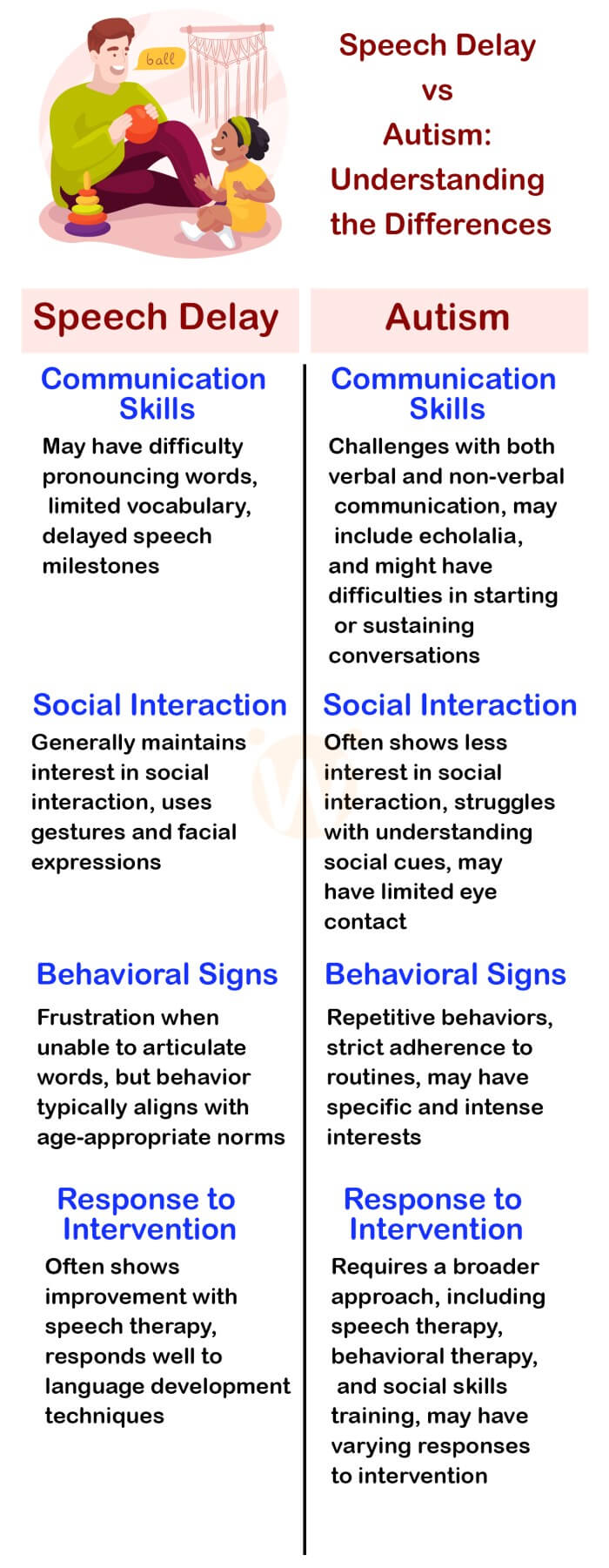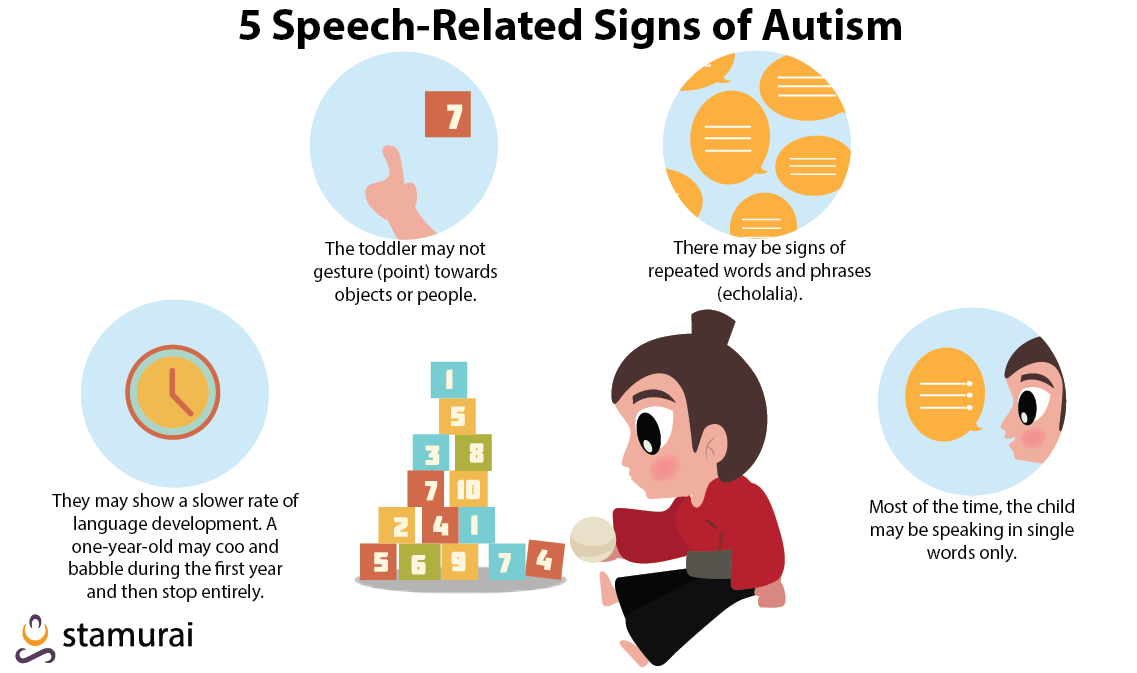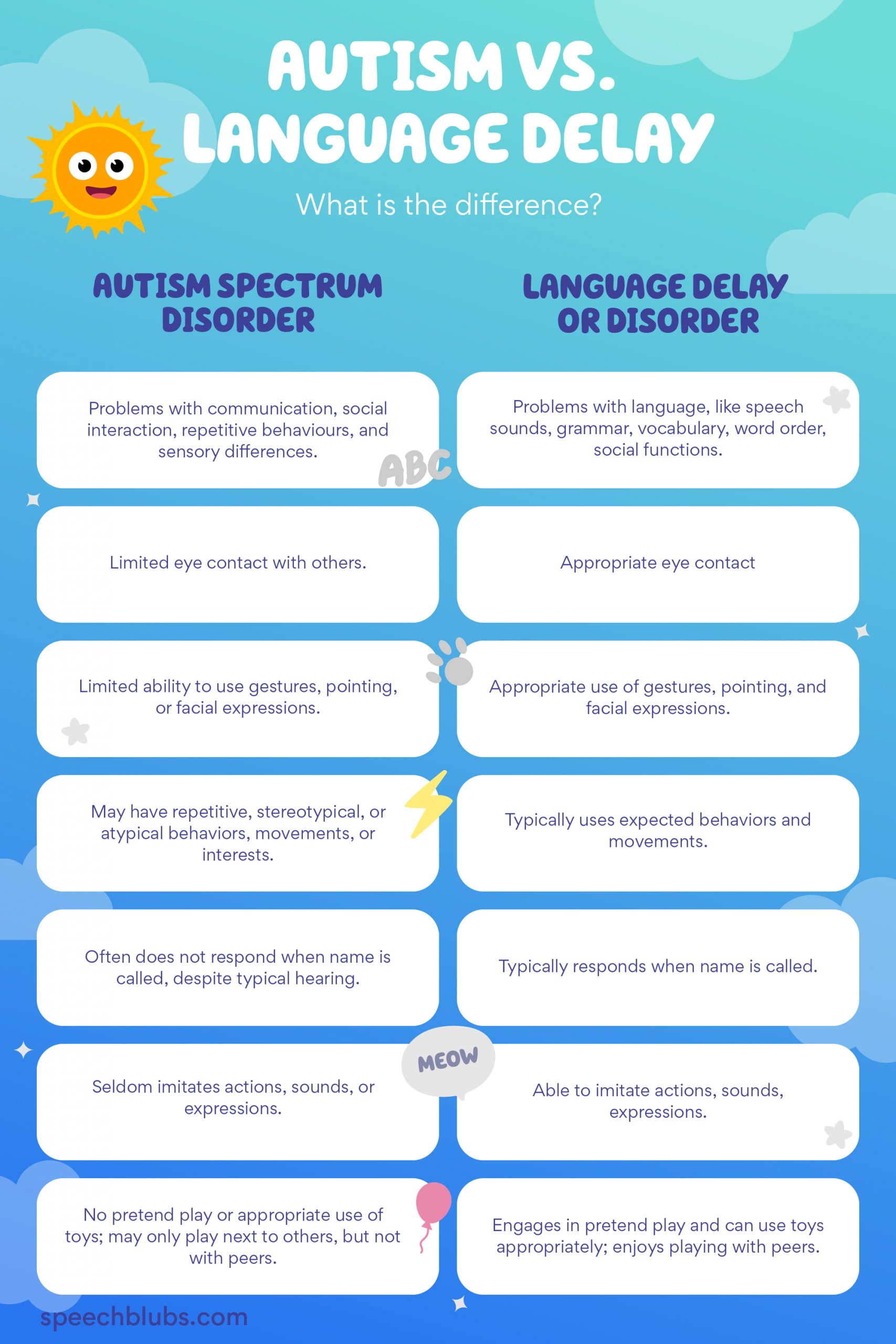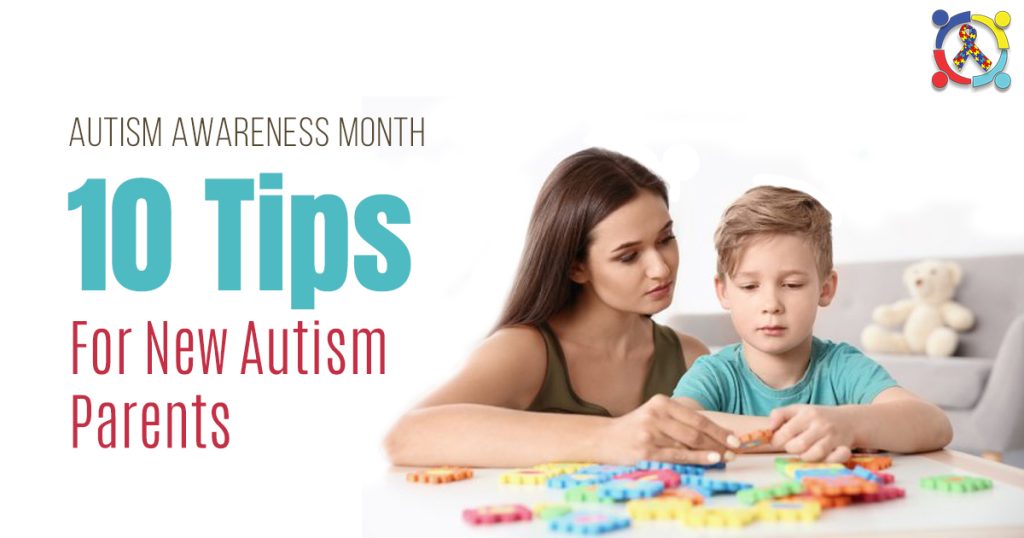You’re noticing your child isn’t speaking as expected, and naturally, you’re concerned. You’re not alone.
Many parents wonder if a speech delay could mean autism. It’s a question that stirs up emotions and worries, but it’s also one that you deserve clarity on. Understanding the connection—or lack thereof—between speech delays and autism can ease your mind and help you take the right steps for your child’s development.
Imagine the relief of knowing exactly what to do next, armed with knowledge that empowers you to support your child effectively. Stay with us as we unravel the truth behind this common concern, providing insights that could make a significant difference in your journey.

Credit: www.mywellnesshub.in
Speech Delay And Autism
Speech delay and autism often get linked, but they’re not the same. Many children with speech delay do not have autism. Understanding these differences helps parents and caregivers. Let’s explore speech delay and autism.
Understanding Speech Delay
Speech delay means a child doesn’t speak at the expected age. It varies in severity. Some children may say a few words. Others might struggle forming sentences. Causes include hearing issues, lack of stimulation, or developmental challenges. Early intervention can help improve speech skills.
What Is Autism?
Autism is a developmental disorder. It affects communication and behavior. Symptoms range from mild to severe. Children with autism may have difficulty with social interactions. They might also show repetitive behaviors or have specific interests. Early diagnosis and support are crucial for development.
Common Causes Of Speech Delay
Understanding the common causes of speech delay can help you support your child’s communication development effectively. While it’s easy to jump to conclusions, not every speech delay indicates autism. Several factors contribute to speech delays, and recognizing them can be the first step in addressing the issue. Let’s dive into some key causes that might be affecting your child’s speech development.
Developmental Disorders
Developmental disorders, such as autism spectrum disorder, often impact speech and communication skills. However, autism is not the only developmental issue that can cause delays. Conditions like Down syndrome or cerebral palsy can also affect speech development. If your child has been diagnosed with a developmental disorder, speech therapy can offer practical strategies to help improve their communication skills.
Environmental Factors
Sometimes, the environment plays a significant role in speech development. A child growing up in a multilingual home might take longer to start speaking because they are processing multiple languages. Additionally, limited interaction or exposure to speech can hinder progress. Are there enough opportunities for your child to engage in conversations? Encouraging communication through regular interaction can make a significant difference.
Hearing Impairments
Hearing impairments can be a major cause of speech delays. If a child cannot hear sounds clearly, they may struggle to reproduce them accurately. This was the case for my nephew, who was diagnosed with mild hearing loss. Once treated with hearing aids, his speech improved dramatically. Could undetected hearing issues be affecting your child’s speech? Consulting an audiologist might provide answers and solutions.
Addressing speech delays early can significantly impact your child’s overall development. Whether it’s through therapy, environmental changes, or medical treatment, taking action is crucial. What steps will you take today to support your child’s speech journey?
Signs Of Autism In Children
Understanding the signs of autism in children is crucial for early intervention. Autism Spectrum Disorder (ASD) affects communication, behavior, and social skills. It varies widely in symptoms and severity. Parents often notice signs in early childhood.
Social Interaction Challenges
Children with autism may struggle with social interaction. They might avoid eye contact or seem uninterested in playing with others. They may not respond to their name or show limited interest in peers. These challenges can make forming friendships difficult.
Repetitive Behaviors
Repetitive behaviors are common in children with autism. They may engage in repetitive movements like rocking or spinning. They might insist on routines or rituals. This behavior provides comfort and predictability. Changes can lead to distress or anxiety.
Communication Difficulties
Communication difficulties are a hallmark of autism. Some children may be nonverbal, while others have limited speech. They may struggle to express their needs or understand simple directions. They might use gestures more than words or repeat phrases.

Credit: www.stamurai.com
Differences Between Speech Delay And Autism
Speech delay and autism are distinct conditions. Speech delay often relates to language development issues. Autism involves challenges in social interaction and communication. Not all speech delays indicate autism. Understanding differences helps in identifying the right support for each condition.
Understanding the differences between speech delay and autism is important. Both conditions can affect communication skills. Yet, they are not the same. Speech delay refers to a slower development of speech skills. Autism involves a range of symptoms beyond speech issues. Identifying these differences can aid in seeking the right intervention.Speech Delay Characteristics
Speech delay is common in young children. Children with speech delay may speak later than peers. They might struggle with forming words or sentences. But they show typical social skills. They use gestures and eye contact to communicate. Hearing problems or oral-motor skills issues can cause delays. Early intervention often helps improve speech skills.Autism Spectrum Traits
Autism includes a wide range of characteristics. It impacts social interaction and communication. Children with autism might avoid eye contact. They may not respond to their name. Repetitive behaviors are common. They might focus on specific interests intensely. Speech delay can be a symptom of autism. But autism involves broader challenges. Understanding these traits can guide early support. “`Diagnosis And Evaluation
Speech delay doesn’t always mean autism. It can stem from various factors. Accurate diagnosis requires professional evaluation to identify specific causes and tailor appropriate interventions.
Diagnosing and evaluating a speech delay can be a complex process. It often involves multiple steps and specialists to determine the underlying cause. Parents might wonder if a speech delay is a sign of autism, but it’s important to know that not all speech delays are related to autism. Understanding the differences and getting a proper evaluation can guide you toward the right support and interventions.Speech Therapy Assessment
A speech therapy assessment is one of the first steps in evaluating a speech delay. Speech therapists are skilled professionals who assess your child’s communication skills through playful interactions and structured tasks. They look at how well your child understands and uses language, and can suggest exercises to help improve speech. During the assessment, the therapist may observe how your child interacts with you and others. They might use toys and games to encourage your child to speak. You could be surprised at how much children can express through play, even without words.Autism Screening Tests
Autism screening tests can provide more clarity if autism is suspected as a cause of the speech delay. These tests are designed to assess a range of developmental behaviors, not just speech. They help determine if your child’s communication style aligns with typical autism traits. Screenings often involve both questionnaires and observational assessments. You might be asked questions about your child’s behavior in various settings. The goal is to gather comprehensive information to see if further diagnostic testing is needed. If you find yourself concerned about your child’s speech development, don’t hesitate to seek an evaluation. Early diagnosis and intervention can make a significant difference. Is there something specific you’ve noticed that made you worry about a speech delay? Understanding these early signs can be crucial for timely support.Importance Of Early Intervention
Understanding the early signs of speech delay is crucial. Early intervention plays a pivotal role in addressing potential challenges. It offers a pathway to improved outcomes for children. Identifying issues early can make a significant difference in development. Parents can seek guidance and support, ensuring their child receives the best care. Early intervention can help distinguish between speech delay and autism, providing clarity and direction.
Benefits Of Timely Support
Timely support can change a child’s developmental path. Early intervention can enhance communication skills. It encourages better social interactions. Children who receive support early often show remarkable progress. They develop stronger language skills. This support can also boost their confidence and self-esteem. Parents feel empowered with the right tools and resources. Early intervention reduces anxiety for families.
Strategies For Parents
Parents can adopt several strategies to aid their child’s progress. Engage in regular conversations with your child. Use simple words and sentences. Read stories to encourage language development. Create a routine that includes interactive play. Games can be a fun way to learn new words. Encourage your child to express their needs. Listen and respond to their attempts to communicate. Seek professional guidance if unsure. Speech therapists can provide tailored strategies. Connect with support groups for shared experiences.
Myths And Misconceptions
Speech delay does not automatically indicate autism. Each child develops at their own pace, and various factors can influence speech development. Consulting a specialist is crucial for accurate diagnosis and understanding individual needs.
Understanding the connection between speech delays and autism can be challenging. Misconceptions often cloud our judgment. Parents might worry excessively when their child shows signs of speech delay. They might even jump to conclusions, fearing the worst. But not every speech delay indicates autism. It’s crucial to separate myths from reality.Common Misunderstandings
Many people mistakenly believe that speech delay is always linked to autism. This is not true. A child can experience speech delay for various reasons. It could be due to hearing issues, environmental factors, or even bilingual households. Imagine a child growing up in a bilingual home. They may take longer to start speaking because they are processing two languages. Some parents might think that a speech delay means their child will face lifelong challenges. In reality, with proper support and intervention, many children overcome speech delays. Have you ever seen a toddler struggling to speak suddenly become chatty after a few months? This happens more often than you might think.Clarifying The Facts
It’s essential to clarify the facts about speech delay and autism. Autism is a complex condition with diverse symptoms. Speech delay can be one of them, but it is not definitive on its own. Autism involves social and behavioral challenges, not just speech issues. Consider seeing a specialist if you have concerns. They can provide a comprehensive assessment. This will help you understand your child’s situation better. Have you spoken with a professional about your child’s speech delay? You might find reassurance in their expertise. Avoid assuming the worst based on incomplete information. Educate yourself and speak to experts. You’ll feel more empowered and less anxious about your child’s development. Are you ready to look beyond myths and misconceptions?
Credit: speechblubs.com
Frequently Asked Questions
Can You Have Speech Delay Without Autism?
Yes, speech delay can occur without autism. Various factors like hearing issues, developmental disorders, or environmental influences can cause speech delay. Consulting a speech therapist can help identify specific reasons for the delay. Early intervention often improves communication skills effectively.
What Are The Three Main Symptoms Of Autism?
Autism’s main symptoms include social challenges, communication difficulties, and repetitive behaviors. Social challenges involve trouble with interactions. Communication difficulties can include delayed speech. Repetitive behaviors might involve routines or specific interests. Early recognition of these symptoms can lead to timely support and intervention, enhancing development and quality of life.
How To Tell If A Speech Delay Is Autism?
Speech delay alone doesn’t confirm autism. Signs include social challenges, repetitive behaviors, and sensitivity to sensory inputs. Consult a specialist for an accurate diagnosis. Early intervention can significantly help development. Monitoring and understanding other developmental milestones is crucial for a comprehensive evaluation.
Why Would A Child Have Delayed Speech?
A child may have delayed speech due to hearing issues, developmental disorders, or lack of social interaction. Early intervention is crucial for addressing underlying causes. Consulting a speech therapist can help identify specific challenges and create a personalized treatment plan.
Regular check-ups ensure proper diagnosis and effective management.
Conclusion
Speech delays don’t always mean autism. Each child is unique. Many factors can cause speech delays, like hearing issues or developmental differences. Early evaluation helps understand a child’s needs better. Parents should seek advice from specialists. Support from speech therapists can aid development.
Understanding and patience are key. Observing progress helps track growth. Always celebrate small victories. Encouragement boosts confidence. Remember, early intervention can make a big difference. Trust your instincts as a parent. Your child’s well-being is most important. Stay informed and positive.
Every step forward matters.

